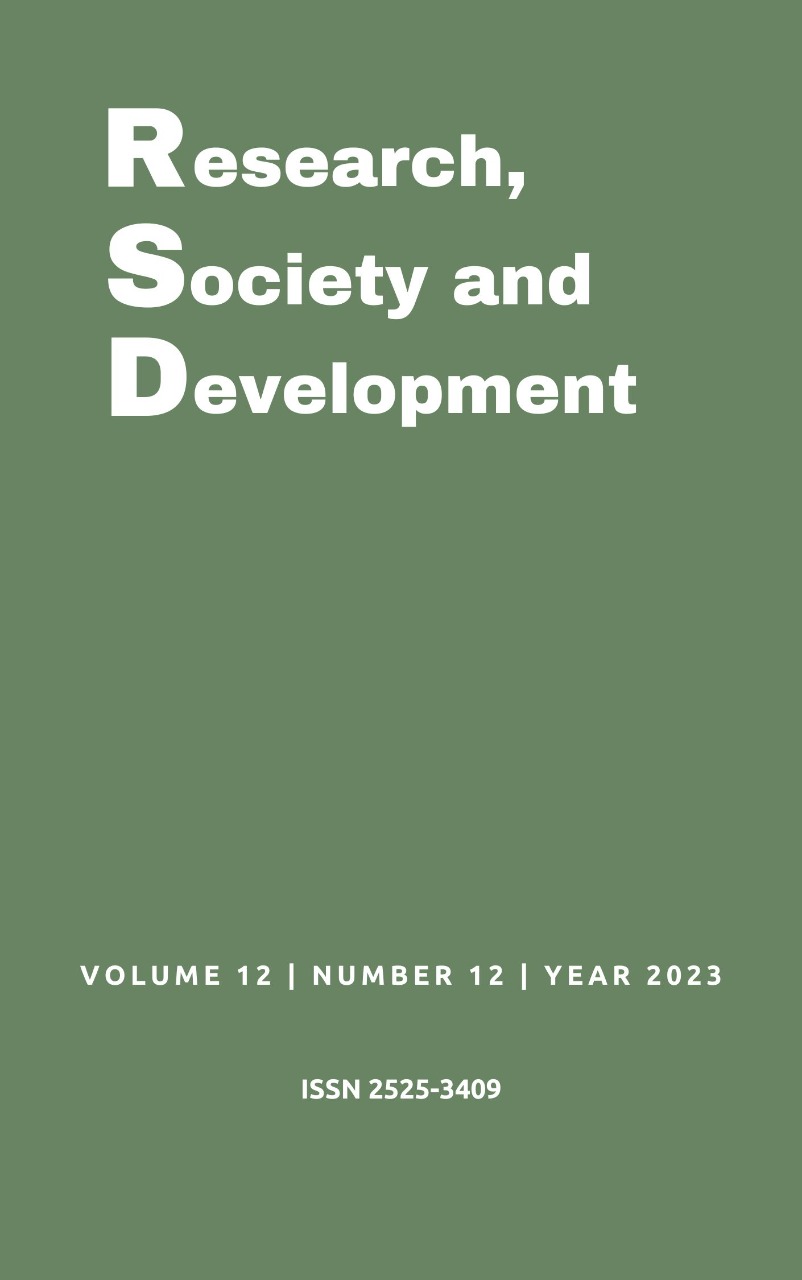Vivências de um projeto de extensão com pessoas idosas na Atenção Primária à Saúde
DOI:
https://doi.org/10.33448/rsd-v12i12.43887Palavras-chave:
Idoso, Atenção primária à saúde, Atividades de lazer, Serviços de saúde para idosos, Qualidade de vida.Resumo
De acordo com o artigo 6º da Constituição Federal de 1988, toda pessoa tem direito ao lazer e à saúde, tais práticas têm sido oportunizadas pelo Projeto de Extensão Recreação para Pessoas Idosas (Recrear). O projeto leva atividades de lazer e ações de educação em saúde à população idosa e aos seus cuidadores. Este trabalho relata a experiência das ações promovidas pelo projeto Recrear na UBS Vila Mariana em São Paulo/SP, em 2022. Trata-se de um relato de experiência das ações do projeto na UBS Vila Mariana, em São Paulo, SP. A equipe foi constituída por treze graduandos de enfermagem, uma pós-graduanda e sete docentes da Escola Paulista de Enfermagem (EPE) pertencente à Universidade Federal São Paulo (UNIFESP). Constituindo-se um grupo participativo de pessoas idosas assistidas pela UBS o que permitiu o vínculo entre extensionistas e público-alvo. Durante os encontros foram desenvolvidas 17 atividades como, por exemplo: jogos de tabuleiro, festa junina, auriculoterapia, meditação e ação educativa “Diet e Light”. Assim, as ações executadas nos permitiram a manutenção da capacidade funcional e a socialização das pessoas idosas; oportunizou o enfrentamento do preconceito contra a pessoa idosa; aprimorou a formação acadêmica e contribuiu para o envelhecimento saudável. Em suma, o projeto tem cunho educativo, cultural e científico que articula, de forma indissociável, o ensino, a extensão, a pesquisa, a assistência e a comunidade viabilizando uma relação transformadora entre instituição, universidade e sociedade.
Referências
Andrade, A. do N., et al. (2014). Percepção de idosos sobre grupo de convivência: estudo na cidade de Cajazeiras-PB. [Elderly's perceptions of living groups: study in the city of Cajazeiras-PB]. Revista Brasileira de Geriatria e Gerontologia, 17(1), 39–48. https://doi.org/10.1590/s1809-98232014000100005.
APA. (2013). Manual diagnóstico e estatístico de transtornos mentais. (5a ed.), Associação Psiquiátrica Americana (APA).
Brasil. (1988). Art. 6º. Constituição da República Federativa do Brasil. Brasília.
Brasil. (2003). Lei nº 1074/2003.Estatuto do Idosos. Brasília.
Carneiro L. P. M., Nicolosi R. M. & Silva, R. R. S. (2021). Os Significados de um Projeto de Lazer para Mulheres Idosas. Licere (Impresso), 24(1).
Costa A. V., & Dias F. B. S. (2023). Projetos de Extensão Universitária e Experiências de Lazer para Pessoas Idosas nas Universidades Públicas Brasileiras. 26(3).
Eliopoulos, C. (2019). Enfermagem gerontológica. (9a ed.), POA: Artmed.
Hammerschmidt KSA, Santana RF (2020). Saúde do Idoso em tempos de Pandemia Covid-19. Cogitare Enfermagem. dx.doi.org/10.5380/ce.v25i0.72849
Instituto Brasileiro de Geografia e Estatística - IBGE (2022). Pesquisa Nacional por Amostra de Domicílios. https://agenciadenoticias.ibge.gov.br/agencianoticias/2012-agencia-de-noticias/noticias/27878-com-envelhecimento-cresce-numero-de-familiares-que-cuidam-de-idosos-no-pais.
IBGE. (2018). Expectativa de vida dos brasileiros aumenta para 76,3 anos em 2018. Agência de Notícias - IBGE. Recuperado de: https://agenciadenoticias.ibge.gov.br/agencia-noticias/2012-agencia-de-noticias/noticias/26103-expectativa-de-vida-dos-brasileiros-aumenta-para-76-3-anos-em-2018.
Kafka, F. (2013). A Metamorfose. [The Metamorphosis]. Companhia das Letras.
Melo, R. H. V. de, & Amorim, K. P. C. (2022). O idadismo no contexto do trabalho da Estratégia Saúde da Família: projeção de saberes ao tetragrama dialógico de Morin. Comunicação, Saúde, Educação, 26. https://doi.org/10.1590/interface.220209.
OMS. (2020). Década do Envelhecimento Saudável: Relatório de Base. Genebra, Organização Mundial da Saúde (OMS).
OMS. (2021). As quatro áreas de ação da década do envelhecimento saudável - OPAS/OMS | Organização Pan-Americana da Saúde. https://www.paho.org/pt/decada-do-envelhecimento-saudavel-nas-americas-2021-2030/quatro-areas-acao-da-decada.
Pereira A. S. et al. (2018). Metodologia da pesquisa científica. UFSM. https://repositorio.ufsm.br/bitstream/handle/1/15824/Lic_Computacao_Metodologia-Pesquisa-Cientifica.pdf?sequence=1&isAllowed=y
Previato, G. F., et al. (2019). Grupo de convivência para idosos na atenção primária à saúde: contribuições para o envelhecimento ativo. Cuidado é Fundamental Online, 11(1), 173–173. https://doi.org/10.9789/2175-5361.2019.v11i1.213-220.
Rodrigues R. A. P, Fhon J. R. S. & Lima F. M. (2021). O cuidado ao idoso na atenção primária à saúde em tempos de COVID-19. Centro de Apoio Editorial da Escola de Enfermagem de Ribeirão Preto, 294. 10.51796/978-65-8856-02-3
Rodrigues WP. Coronavírus: um problema de saúde pública. Scire Salutis 2020;10(2) :18-25. 10.6008/CBPC2236-9600.2020.002.0003
Santos, M. O. S. dos, et al. (2021). Estratégias de comunicação adotadas pela gestão do Sistema Único de Saúde durante a pandemia de Covid-19 – Brasil. Comunicação, Saúde, Educação, 25 (1). https://doi.org/10.1590/interface.200785.
Silveira B. O., Parrião G. B., & Fragelli R. R. (2018) Melhor idade conectada: um panorama da interação entre idosos e tecnologias móveis. Revista Tecnologias em Projeção; 8(2): 42-53. http://revista.faculdadeprojecao.edu.br/index.php/Projecao1/article/view/867
Trapé, E., Monteagudo S., Andrella, J., & Gonçalves, M. (2023). Itinerários de lazer em idosos. Revista Latinoamericana De Estudios Sobre Cuerpos, Emociones Y Sociedad, (42), 10-22. https://www-periodicos-capes-gov-br.ez69.periodicos.capes.gov.br/index.php/buscador-primo.html.
Zmora R., Statz T. L., Birkeland R. W., McCarron H. R., Finlay J. M., Rosebush C. E. & Gaugler J. E. (2021). Transitioning to Long-Term Care: Family Caregiver Experiences of Dementia, Communities, and Counseling. J Aging Health; 33(1-2):133-146.
Downloads
Publicado
Edição
Seção
Licença
Copyright (c) 2023 Amanda Curiel Trentin Corral; Naila Albertina de Oliveira; Diego Ximendes da Silva; Carla Roberta Monteiro Miura; Danila Cristina Paquier Sala; Karine Victória dos Anjos Lima ; Giovanna Maria Ianeczék Braz; Meiry Fernanda Pinto Okuno

Este trabalho está licenciado sob uma licença Creative Commons Attribution 4.0 International License.
Autores que publicam nesta revista concordam com os seguintes termos:
1) Autores mantém os direitos autorais e concedem à revista o direito de primeira publicação, com o trabalho simultaneamente licenciado sob a Licença Creative Commons Attribution que permite o compartilhamento do trabalho com reconhecimento da autoria e publicação inicial nesta revista.
2) Autores têm autorização para assumir contratos adicionais separadamente, para distribuição não-exclusiva da versão do trabalho publicada nesta revista (ex.: publicar em repositório institucional ou como capítulo de livro), com reconhecimento de autoria e publicação inicial nesta revista.
3) Autores têm permissão e são estimulados a publicar e distribuir seu trabalho online (ex.: em repositórios institucionais ou na sua página pessoal) a qualquer ponto antes ou durante o processo editorial, já que isso pode gerar alterações produtivas, bem como aumentar o impacto e a citação do trabalho publicado.


